
From clouds to rocks
A celebration of the world's most treasured emotion:
Title: "Ek samayekhi"
Author: Thilakaratne Kuruwita Bandara
Published by: Sarasavi Publishers
Reviewed by Aditha Dissanayake
[email protected]
|
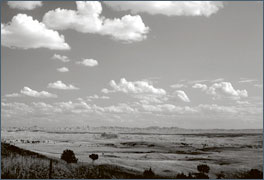
Want to be placed on a white soft, pillow of a cloud?
|
Want to be placed on a white soft, pillow of a cloud on a blanket
blue sky? Can do. But before you find yourself nodding off be prepared
to fall onto rocks hard enough to hurt. An experience guaranteed for
anyone reading Tilakarathna Kuruwita Bandara's latest collection of
poems - "Ek samayekhi".
Flashback to January 30th, 2006. He had given me the book with the
inscription written on the flyleaf "To Aditha, a gift. Write something
about this too". (Meganath Yamak Liyanna).The date - January 30th 2006.
More than one year ago. Procrastination should have been my middle name.
But better now, than never.
Kuruwita Bandara may not say so, but most of his poems have the
resonance of Billy Collins' lines "I wonder how you are going to
feel/when you find out/that I wrote this instead of you". Like Collins'
poems the poems in this collection too fill the gap between the writer
and the reader, making us feel, we too are poets - well, almost.
This is achieved through page upon page of poetry that lead you to be
alone with the poet's thoughts. The result: you feel as though you have
given yourself over to another human being who has the same thoughts as
you.
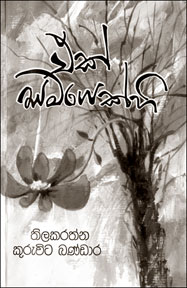 The poem titled "Separation" could be your thoughts when you
desperately yearn for the company of a loved one living in a foreign
country. "On this part of the world, the sun rises/On your part, it is
setting. The poem titled "Separation" could be your thoughts when you
desperately yearn for the company of a loved one living in a foreign
country. "On this part of the world, the sun rises/On your part, it is
setting.
When the clock strikes six my heart fills with pain... I am waiting
for you to come back, so that the sun will rise for both of us at the
same time" articulated in a much more better way than you ever will.
In "The book and the woman" he finds his ideal love. " He feels men
and women in books are much more lovable than the men and the women in
the real world. One who is sensitive will never find peace in this cruel
world. Seeking the solace of the men and women in books, when he steps
into the library he finds there, a woman among the books who should have
been inside a book!"
From the clouds to the rocks below. "The Parting" is a bitter pill to
swallow. "Never thought I will have to say words like these" writes the
poet. "Even though I was mesmerized by you, I found another more
alluring world - unexpectedly.
I am not a hypocrite. I cannot love you anymore, cannot bring back my
heart, which is now elsewhere. I know you will not forgive me, but I
must part". Tough, yes. And full of wisdom too.
When he discovers a rose in full bloom on the clothes line he does
not waste his energy trying to find out how it grew on the wire. "Why
bother about the reasons. Is it not enough that it happened."
And now, to the best of them all. Love. In Premaya the poet describes
how, like a poet of the Colombo era, he loved her, insanely and how she
remained complex (and stiff) like a poet of the Peradeniya era.
In "Gal Palliya", he recalls the day ,when there were no weddings
inside the stone church, the two of them had got married. "No
signatures, no witnesses, no blessings, only the saints staring, staring
and wondering if one or the other will break the promise to love till
death parts them.
Like in Buddhadasa Galappathy's Nimi Nathi Thunyama, here too, the
moon shines bright, proving that love, poets and the moon are
inseparable no matter when or where they live.
There are two moons in the poem titled "Sanda". One which shines on
the surface of the water, is compared to the lady, blurred, unclear,
totally opposite of the moon in the sky, clear, precise. Implying in
other words that the poet is steady in his love, unlike the lady who
does not know her mind or her heart.
"Ek Samayekhi" is a celebration of love, longed for and finally
found, love requited and unrequited; love secret and spread wide across
the sky. This literary valentine is a fitting tribute to the world's
most powerful emotion. Still sceptical? Turn to page 13.
The good, the bad but not the ugly
Yesterday is Another Country by Somasiri Devendra will be launched
at 5.30 pm on Saturday, March 1st at Gandhara Gallery 28, Stratford
Avenue, Colombo 6.
by Aditha Dissanayake
[email protected]
|
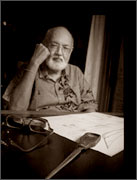
Somasiri Devendra
|
|
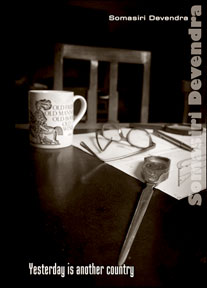
Yesterday is Another Country by Somasiri Devendra will be
launched at 5.30 pm on Saturday, March 1st at Gandhara Gallery
28, Stratford Avenue, Colombo 6.
|
He looks a bit like Richard Bach. He looks a bit like Ernest
Hemingway.Mmmm. No. He looks exactly like his elder brother, Tissa
Devendra. How often have I mistaken one for the other? How often had I
realized half way into the conversation that I was talking to the wrong
"Mr. Devendra"? How often have I apologised saying "I thought you are
your brother"? This time though, Somasiri Devendra makes things easy for
me.
"Its only six months old" he apologises running his fingers through
the silver strands covering his chin.But whether old or fresh, a beard
is a beard and just the right thing for him and me too - no more
mistakes when it comes to identifying the two brothers.The silver beard
= the younger of the two.
It is hard not to think of the Devendras when you talk of talent
running in the family. "We come from a family of writers" says Somasiri.
"Tissa, Ransiri and I". No doubt a talent inherited from their father
who was also a prolific writer.
Having grown up in an era when there were no telephones, no
computers, no emails, he recalls writing long letters to each other. He
claims the other two are the "senior writers" - specially Ransiri, who
though the youngest has been the most successful of the three.
Which is saying a lot, for he, himself has authored several "serious
books" on naval history, maritime archaeology and ethnography in
addition to the account of his father's childhood titled The Way We
Grew" (2001) and many short stories published in journals and
newspapers.
I learn of his connections with the navy when he spells the email
address of the Sunday Observer picture's section in navy jargon; p for
property(?) i for India and x for X-ray equals pix".
Having introduced Maritime Archaeology to Sri Lanka he has worked
voluntarily as a Special Advisor for the Department of Archaeology and
initiated the establishment of a Maritime Archaeological Unit. But, he
has not, as yet thought of penning his experiences in the navy into the
form of a book. He thinks "It is too early to write about the navy yet".
What is not too early, though, is to record the past fifty years of
his life in the form of a collection of essays which he has called
"Yesterday is Another Country".
Having an aversion to biographies and autobiographies he says he has
made the stories more readable by concentrating on the events of the
past fifty years that had made an impression on him.
"I deliberately kept off writing about our childhood because Ransiri
and Tissa have already written about it. Tissa has been writing about
his work and I have been pushing him to do so. But my book has nothing
to do with my work in the navy".
In this collection he has divided life into three groups; when life
was relaxed, in his personal life as well as in the country, when he
(and the country) underwent a fairly stressful period and what life
should be in the years to come.
"Some of the essays are gloomy, some are lighthearted, but the last
few stories are neither gloomy nor lighthearted. They are not linked to
each other. The only link is himself. The good and the bad sides of his
character. At times the hero, at times the villain, at times an
observer. In each of the events he was a different man. "Not the me of
today".
"I have been working for other people all this time" says Somasiri.
"I have given up all that voluntary work now and will be concentrating
on my own work. This book should have been written long ago". His next
venture will be a book on Sri Lankan ships in ancient times.
"Don't expect too much from Yesterday is Another Country" he warns
the reader. There are no words of wisdom, no message no moral in these
stories of the past.
More the reason why they should be read.
Life story
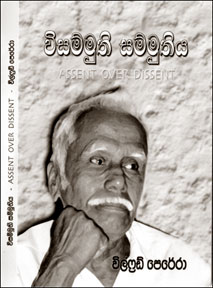 An illustrious teacher of our times has written the story of forty
five years of his life centerin on teaching, politics and writing. The
book titled "Visammuthi Sammuthiya" (Assent Over Dissent) was launched
at St. Benedict's College Hall on February 23. An illustrious teacher of our times has written the story of forty
five years of his life centerin on teaching, politics and writing. The
book titled "Visammuthi Sammuthiya" (Assent Over Dissent) was launched
at St. Benedict's College Hall on February 23.
Wilfred Perera, a staunch supporter of the leftist politics in the
country, joined the Lanka Sama Samaja Party in 1952. As a member of the
party, he co-edited the party newspaper Sama Samajaya and later became
the editor of the paper. Disillusioned with the principles of the LSSP
he left the party in 1964.
Retiring from his teaching profession he took to editing and writing.
He was one time editor of Sadharanaya and Sanvaada the magazine of the
Christian workers' fellowship.
Among the books, he has authored are Muthu Etaya, Samaja Saadharanaya
Ha Adhikaranaya (translations), Abhiyogaya (poetry) and Selalihiniya a
study aid.
He has also authored a book on child labour for UNESCO.
The Encyclopaedia of Buddhism
The International English medium of Buddhism Project launched by the
Government of Sri Lanka in 1955, to commemorate the 2500th Buddha
Jayanthi, under the pioneering Editor-in-Chief, Professor Emeritus G.P
Malalasekera, is nearing its completion now.
The Encyclopaedia of Buddhism covering a vast field of Buddhist
Doctrines and Philosophy, culture and diverse Buddhist activities has
been planned to be completed in eight volumes with an Index volume.
The first Fascicle of Volume VIII has been completed and is already
been printed. The second Fascicle of Volume VIII is now in its proof
stage. It will be completed and released by the end of March/April 2008
Dr. W.G Weeraratne, Editor-in-Chief, Encyclopaedia
of Buddhism
Commonwealth writers prize
Shortlists:
The shortlists for the 2008 Commonwealth Writers Prize; Best Book
Award and Best First Book Award were announced on Wednesday 13 February.
Four international judging panels in each Commonwealth region; Africa;
Canada and the Caribbean, Europe and South Asia; and South East Asia and
South Pacific have chosen the books in each region from an impressive
list of 320 entries.
Some of the catogories are
Africa
Best Book Award
Barbara Adair, End, South Africa
Ifeoma Chinwuba, Waiting for Maria, Nigeria
Finuala Dowling, Flyleaf, South Africa
Karen King-Aribisala, The Hangman's Game, Nigeria
Susan Mann, Quarter Tones, South Africa
Zakes Mda, Cion, South Africa
Best First Book Award
Sade Adeniran, Imagine This, Nigeria
Ceridwen Dovey, Blood Kin, South Africa
Dayo Forster, Reading the Ceiling, Gambia
Ken Kamoche, A Fragile Hope, Kenya
Sumayya Lee, The Story of Maha, South Africa
Carel van der Merwe, No Man's Land, South Africa
Canada and the Caribbean
Best Book Award
Gil Adamson, The Outlander, Canada
Erna Brodber, The Rainmaker's Mistake, Jamaica
Lawrence Hill, The Book of Negroes, Canada
Robert Hough, The Culprits, Canada
Frances Itani,Remembering the Bones, Canada
Michael Ondaatje, Divisadero, Canada
Best First Book Award
David Chariandy, Soucouyan,t Canada
Tish Cohen, Town House , Canada
Arley McNeney ,Post, Canada
Ameen Merchant, The Silent Raga Canada
C.S. Richardson, The End of the Alphabet,Canada
Neil Smith Bang, Crunch,Canada
Europe and South Asia
Best Book Award
David Davidar,The Solitude of Emperors,India
Mohsin Hamid, The Reluctant Fundamentalist,Pakistan
Usha K.R. ,Girl and a River,India
Hari Kunzru, My Revolutions, Britain
Nicholas Shakespeare, Secrets of the Sea, Britain
Indra Sinha, Animal's People, India |
